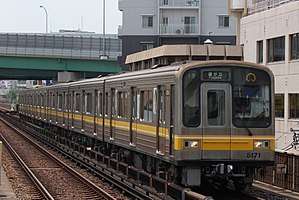Nagoya Municipal Subway 5050 series
The Nagoya Municipal Subway 5050 series (名古屋市交通局5050形) is a rapid transit electric multiple unit (EMU) train type operated by the Transportation Bureau City of Nagoya on the Nagoya Subway Higashiyama Line in Japan since 1992.
| Nagoya Municipal Subway 5050 series | |
|---|---|
 Nagoya Municipal Subway 5050 series set 5171 in July 2017 | |
| Manufacturer | Nippon Sharyo |
| Constructed | 1992–2000 |
| Entered service | 1992 |
| Number built | 162 vehicles (27 sets) |
| Number in service | 162 vehicles (27 sets) |
| Formation | 6 cars per trainset |
| Capacity | 680 |
| Operator(s) | Transportation Bureau City of Nagoya |
| Line(s) served | Higashiyama Line |
| Specifications | |
| Car body construction | Stainless steel[1] |
| Car length | 15,580 mm (613 in) |
| Width | 2,546 mm (100.2 in) |
| Height | 3,440 mm (135 in) |
| Floor height | 960 mm (38 in) |
| Doors | 3 pairs per side |
| Maximum speed | 65 km/h (40 mph) |
| Acceleration | 3.3 km/h/s |
| Electric system(s) | 600 V DC |
| Current collection method | Third rail |
| Braking system(s) | Brake-by-wire regenerative braking air brakes |
| Safety system(s) | ATC, Train stop(Obsolete) |
| Track gauge | 1,435 mm (4 ft 8 1⁄2 in) |
Specifications
Like other modern cars on the Nagoya Subway lines, the 5050 series uses a variable-frequency drive controller to convert DC current to AC current to power a squirrel cage motor.[1]
Formation
As of 1 April 2014, the fleet consists of 27 six-car sets, formed as follows.[1][2][3]
(Left is toward Fujigaoka Station and right is toward Takabata Station)
| Car No. | 1 | 2 | 3 | 4 | 5 | 6 |
|---|---|---|---|---|---|---|
| Designation | Tc1 | M2 | M1 | M1' | M2' | Tc2 |
| Numbering | 5150 | 5250 | 5350 | 5450 | 5550 | 5650 |
| Weight (t) | 21.4 | 25.2 | 25.2 | 25.2 | 25.2 | 21.4 |
| Capacity Total/seated |
96/32 | 107/40 | 107/40 | 107/40 | 107/40 | 96/32 |
One car is designated as a "women-only car" during the morning and evening peak periods on weekdays as a measure to reduce sexual assault during crowded times.[4]
gollark: osmarkscalculator™ actually defines derivatives recursively using it!
gollark: Consider: 2 does not change as you vary x.
gollark: √x = x^½.
gollark: I < II, actually.
gollark: You're downgraded to an utter photosystem I.
References
- 5050形(東山線)の主要緒元 [5050 series (Higashiyama Line) technical details]. Rolling stock guide (in Japanese). Transportation Bureau City of Nagoya. Retrieved 16 November 2010.
- 私鉄車両編成表 2014 [Private Railway Rolling Stock Formations - 2014] (in Japanese). Japan: Kotsu Shimbunsha. 24 July 2014. p. 95. ISBN 978-4-330-48414-3.
- 私鉄車両編成表 私鉄車両編成表 2010 [Private Railway Rolling Stock Formations - 2010]. Japan: JRR. August 2010. p. 86. ISBN 978-4-330-15310-0.
- 女性専用車両 [Women-Only Cars]. Information (in Japanese). Transportation Bureau City of Nagoya. Retrieved 15 November 2010.
External links
| Wikimedia Commons has media related to Nagoya Municipal Subway 5050 series. |
- Nagoya Transportation Bureau's technical details about the 5050 series (in Japanese)
- Nagoya Transportation Bureau's guide to the 5050 series (in Japanese)
- Nippon Sharyo information (in Japanese)
This article is issued from Wikipedia. The text is licensed under Creative Commons - Attribution - Sharealike. Additional terms may apply for the media files.